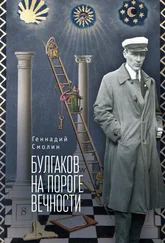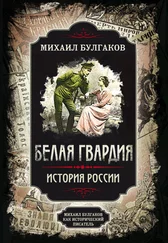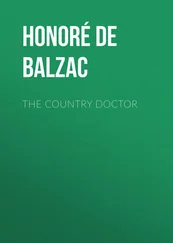I dressed, threw an overcoat over my shoulders, and hoping that all would be well, ran to the hospital through the rain across the creaking duckboards. At the entrance I could see a cart in the semi-darkness, the horse pawing at the rotten boards under its hooves.
‘Did you bring the woman in labour?’ I asked the figure lurking by the horse.
‘Yes, that’s right … we did, sir,’ a woman’s voice replied dolefully.
Despite the hour, the hospital was alive and bustling. A flickering pressure-lamp was burning in the surgery. In the little passage leading to the delivery room Aksinya slipped past me carrying a basin. A faint moan came through the door and died away again. I opened the door and went into the delivery room. The small, whitewashed room was brightly lit by a lamp in the ceiling. On a bed alongside the operating table, covered with a blanket up to her chin, lay a young woman. Her face was contorted in a grimace of pain and wet strands of hair were sticking to her forehead. Holding a large thermometer, Anna Nikolaevna was preparing a solution in a graduated jug, while Pelagea Ivanovna was getting clean sheets out of the cupboard. The feldsher was leaning against the wall in a Napoleonic pose. Seeing me, they all jerked into life. The pregnant woman opened her eyes, wrung her hands and renewed her pathetic, long drawn-out groaning.
‘Well now, what seems to be the trouble?’ I asked, sounding confident.
‘Transverse lie,’ Anna Nikolaevna answered promptly as she went on pouring water into the solution.
‘I see-ee,’ I drawled, and added, frowning: ‘Well, let’s have a look …’
‘Aksinya! Wash the doctor’s hands!’ snapped Anna Nikolaevna. Her expression was solemn and serious.
As the water flowed, rinsing away the lather from my hands, reddened from scrubbing, I asked Anna Nikolaevna a few trivial questions, such as when the woman had been brought in, where she was from … Pelagea Ivanovna’s hand turned back the blanket, I sat down on the edge of the bed and began gently feeling the swollen belly. The woman groaned, stretched, dug her fingers into her flesh and crumpled the sheet.
‘There, there, relax … it won’t take long,’ I said as I carefully put my hands to the hot, dry, distended skin.
The fact was that once the experienced Anna Nikolaevna had told me what was wrong, this examination was quite pointless. I could examine the woman as much as I liked, but I would not find out any more than Anna Nikolaevna knew already. Her diagnosis was, of course, correct: transverse lie. It was obvious. Well, what next?
Frowning, I continued palpating the belly on all sides and glanced sidelong at the midwives’ faces. Both were watching with intense concentration and their looks registered approval of what I was doing. But although my movements were confident and correct, I did my best to conceal my unease as thoroughly as possible.
‘Very well,’ I said with a sigh, standing up from the bed, as there was nothing more to be seen from an external examination. ‘Let’s examine her internally.’
Another look of approval from Anna Nikolaevna.
‘Aksinya!’
More water flowed.
‘Oh, if only I could consult Döderlein now!’ I thought miserably as I soaped my hands. Alas, this was quite impossible. In any case, how could Döderlein help me at a moment like this? I washed off the thick lather and painted my fingers with iodine. A clean sheet rustled in Pelagea Ivanovna’s hands and, bending down over the expectant mother, I began cautiously and timidly to carry out an internal examination. Into my mind came an involuntary recollection of the operating theatre in the maternity hospital. Gleaming electric lights in frosted-glass globes, a shining tiled floor, taps and instruments a-glitter everywhere. A junior registrar in a snow-white coat is manipulating the woman, surrounded by three intern assistants, probationers, and a crowd of students doing their practicals. Everything bright, well ordered and safe.
And there was I, all on my own, with a woman in agony on my hands and I was responsible for her. I had no idea, however, what I was supposed to do to help her, because I had seen childbirth at close quarters only twice in my life in a hospital, and both occasions were completely normal. The fact that I was conducting an examination was of no value to me or to the woman; I understood absolutely nothing and could feel nothing of what was inside her.
It was time to make some sort of decision.
‘Transverse lie … since it’s a transverse lie I must … I must …’
‘Turn it round by the foot,’ muttered Anna Nikolaevna as though thinking aloud, unable to restrain herself.
An older, more experienced doctor would have looked askance at her for butting in, but I am not the kind to take offence.
‘Yes,’ I concurred gravely, ‘a podalic version.’
The pages of Döderlein flickered before my eyes. Internal method … Combined method … External method … Page after page, covered in illustrations. A pelvis; twisted, crushed babies with enormous heads … a little dangling arm with a loop on it.
Indeed I had read it not long ago and had underlined it, soaking up every word, mentally picturing the interrelationship of every part of the whole and every method. And as I read it I imagined that the entire text was being imprinted on my brain for ever.
Yet now only one sentence of it floated back into my memory:
‘A transverse lie is a wholly unfavourable position.’
Too true. Wholly unfavourable both for the woman and for a doctor who only qualified six months ago.
‘Very well, we’ll do it,’ I said as I stood up.
Anna Nikolaevna’s expression came to life.
‘Demyan Lukich,’ she turned to the feldsher , ‘get the chloroform ready.’
It was a good thing that she had said so, because I was still not certain whether the operation was supposed to be done under anaesthesia or not! Of course, under anaesthesia—how else?
Still, I must have a look at Döderlein …
As I washed my hands I said:
‘All right, then … prepare her for anaesthesia and make her comfortable. I’ll be back in a moment; I must just go to my room and fetch some cigarettes.’
‘Very good, doctor, we’ll be ready by the time you come back,’ replied Anna Nikolaevna.
I dried my hands, the nurse threw my coat over my shoulders and without putting my arms into the sleeves I set off for home at a run.
In my study I lit the lamp and, forgetting to take off my cap, rushed straight to the bookcase.
There it was—Döderlein’s Operative Obstetrics . I began hastily to leaf through the glossy pages.
‘… version is always a dangerous operation for the mother …’
A cold shiver ran down my spine.
‘The chief danger lies in the possibility of a spontaneous rupture of the uterus …’
Spon-tan-e-ous …
‘If in introducing his hand into the uterus the obstetrician encounters any hindrances to penetrating to the foot, whether from lack of space or as a result of a contraction of the uterine wall, he should refrain from further attempts to carry out the version …’
Good. Provided I am able, by some miracle, to recognise these ‘hindrances’ and I refrain from ‘further attempts’, what, might I ask, am I then supposed to do with an anaesthetised woman from the village of Dultsevo?
Further:
‘It is absolutely impermissible to attempt to reach the feet by penetrating behind the back of the foetus …’
Noted.
‘It must be regarded as erroneous to grasp the upper leg, as doing so may easily result in the foetus being revolved too far; this can cause the foetus to suffer a severe blow, which can have the most deplorable consequences …’
Читать дальше
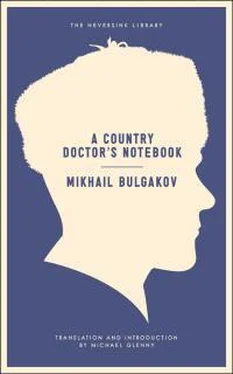
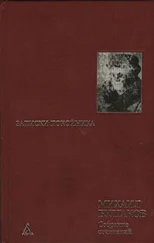
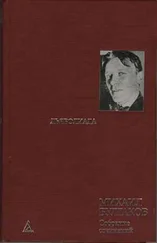
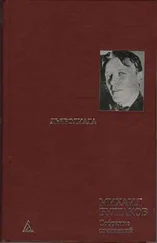


![Михаил Булгаков - Весь Булгаков [litres; сборник]](/books/400110/mihail-bulgakov-ves-bulgakov-litres-sbornik-thumb.webp)


